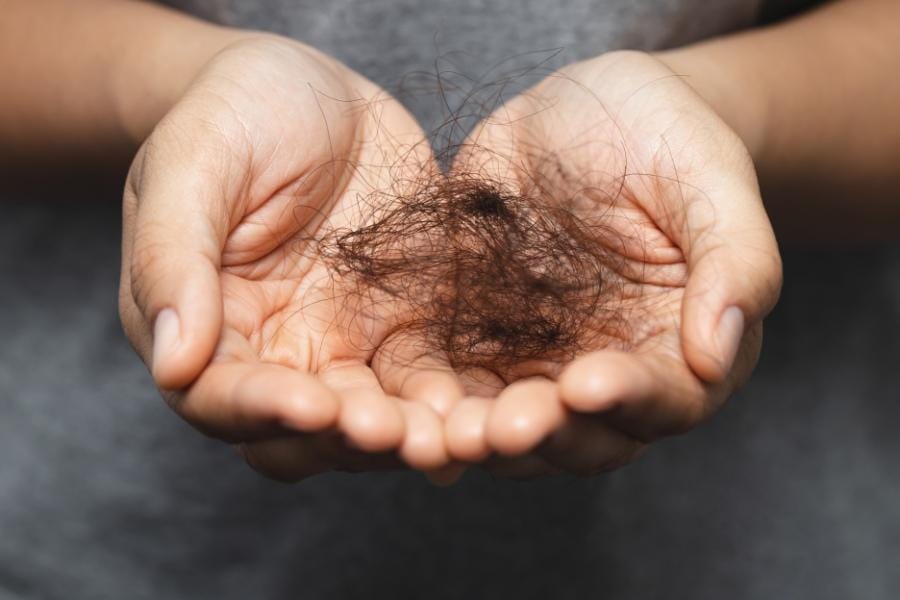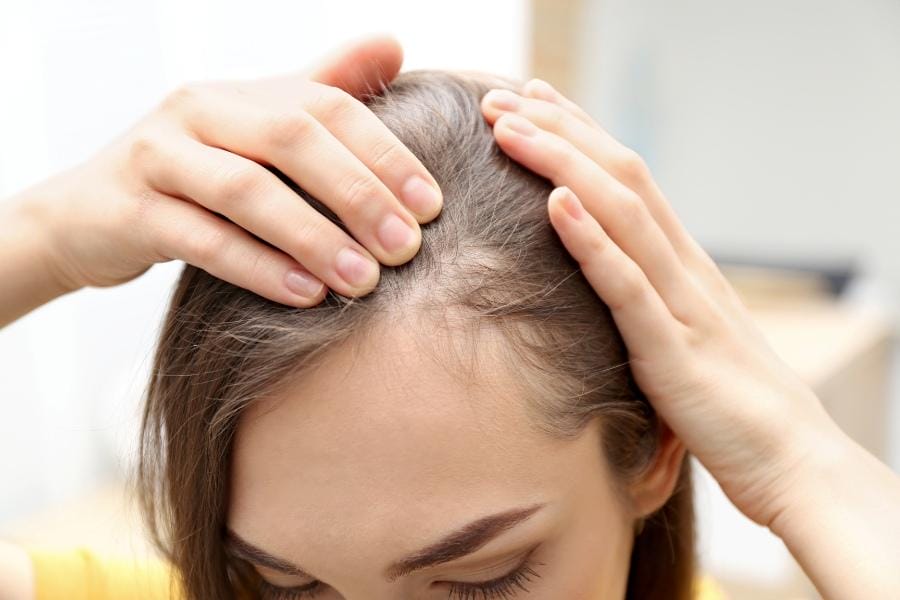Living with multiple sclerosis—or loving someone who does—means navigating a maze of unexpected challenges.
When hair begins thinning or falling out, it can feel like yet another difficult symptom to understand and manage. If you’ve noticed changes in your hair since your MS diagnosis, you’re not alone in your concern.
Let me reassure you right away: Multiple sclerosis does not directly cause hair loss. MS affects your central nervous system—your brain and spinal cord—not your hair follicles themselves.
However, there are several meaningful connections between MS and hair changes that deserve our careful attention and understanding.
In this guide, we’ll walk together through the real relationship between multiple sclerosis and hair loss. I’ll help you understand the actual causes behind thinning hair when you have MS, and share practical, effective strategies for maintaining healthy hair while managing this challenging neurological condition. You deserve both answers and solutions as you navigate this aspect of life with MS.
The Connection Between Multiple Sclerosis and Hair Loss Concerns – Does MS Cause Baldness?
IN THIS ARTICLE

Multiple sclerosis and hair loss concerns often intertwine because many patients notice changes in their hair after diagnosis.
This observation naturally leads to questions about whether the disease itself might be affecting hair growth.
Is hair loss a common symptom of multiple sclerosis?
As a chronic, unpredictable neurological condition, MS causes the immune system to mistakenly attack the protective covering (myelin) around nerve fibers in the central nervous system.
This damage disrupts communication between the brain and the rest of the body, leading to a wide range of symptoms like:
- Fatigue
- Mobility issues
- Cognitive changes
- Vision problems
Hair health, meanwhile, depends on properly functioning hair follicles, adequate nutrition, hormonal balance, and overall wellbeing—factors that can be indirectly affected by living with MS.
The uncertainty that characterizes MS often extends to understanding seemingly unrelated symptoms like hair thinning, leaving patients wondering where to turn for answers.
The Direct Relationship: Does MS Itself Cause Hair Loss?
Multiple sclerosis does not directly attack hair follicles or cause alopecia as part of its disease process.
This fact offers some reassurance to those worried that MS might be directly responsible for their thinning hair. MS is specifically a demyelinating disease that affects the central nervous system—the brain and spinal cord—rather than causing changes to hair follicles or growth cycles.
The misconception that MS directly causes hair loss likely stems from the timing of hair changes that sometimes coincide with diagnosis or disease progression.
However, medical research has consistently shown that the autoimmune activity in MS targets myelin in the nervous system, not hair structures.
Understanding this distinction is crucial because it helps patients and healthcare providers look for the actual causes of hair loss, which usually fall into three categories:
- Medication side effects
- Stress response, or
- Nutritional impacts related to living with a chronic condition.
How Does MS Medication Impact Hair Loss?

MS medications, particularly certain disease-modifying therapies (DMTs), can contribute to hair thinning and loss as a documented side effect.
This connection represents the most common link between multiple sclerosis and hair changes. Studies have identified several MS treatments with higher associations to hair-related side effects:
- Teriflunomide (Aubagio) – Between 10-14% of patients experience hair thinning, compared to 5% on placebo. According to FDA reports, this medication accounts for approximately 42% of alopecia cases related to MS drugs.
- Beta interferons (both Beta-1a and Beta-1b) – Approximately one-third of people taking these medications report some degree of hair loss in clinical studies.
- Cladribine (Mavenclad) – About 3% of patients in clinical trials reported hair loss with this treatment.
Most medication-induced hair loss occurs through a process called telogen effluvium—a temporary condition where hair follicles prematurely enter the resting phase of the hair growth cycle. The good news? This type of hair loss is typically temporary, with improvement often seen within three months, even without discontinuing treatment. Hair regrowth usually occurs once the body adjusts to the medication, offering hope to those experiencing this challenging side effect.
Steroids and Other MS Treatments That May Affect Hair
Corticosteroids frequently used during MS relapses can affect hair follicle health and disrupt normal growth cycles.
These powerful anti-inflammatory medications, though vital for managing acute MS symptoms, sometimes contribute to hair thinning. Steroids work by suppressing immune system activity, but this immune suppression can inadvertently affect the normal cycling of hair follicles.
Hematopoietic stem cell transplantation (HSCT), an intensive treatment option for certain MS cases, often results in complete but temporary hair loss similar to chemotherapy patients. This procedure aims to “reset” the immune system by replacing damaged cells with healthy ones.
While effective for some patients with aggressive MS, the process typically causes widespread hair shedding due to its impact on rapidly dividing cells throughout the body, including those in hair follicles.
For both steroid treatments and HSCT, hair regrowth typically begins once treatment concludes, though the timeline varies significantly between individuals.
Some patients report complete hair recovery within 6-12 months, while others may notice changes in hair texture or thickness even after regrowth.
Stress, MS, and Hair Loss: The Hidden Connection

Psychological stress triggered by MS diagnosis, symptom flares, and disease management can directly contribute to a type of hair loss called telogen effluvium.
This stress-induced hair shedding occurs when significant physical or emotional stress pushes a large number of hair follicles into a resting phase simultaneously. Within 2-3 months after a stressful event, affected hairs fall out suddenly when combing or washing your hair.
The relationship between stress and MS creates a challenging cycle: MS symptoms cause stress, which then potentially triggers hair loss, which creates more stress about appearance and health.
This circular pattern highlights why addressing stress management becomes essential for both MS symptom control and maintaining hair health.
Common stress-related hair loss signs include:
- Diffuse thinning across the scalp rather than in patches
- Increased hair shedding during washing or brushing
- Hair loss beginning 2-3 months after a significant stressful event
- Noticeable reduction in hair volume without complete baldness
Breaking this cycle requires comprehensive stress management strategies specifically tailored to MS patients’ unique challenges.
Nutritional Factors: How MS Can Indirectly Affect Hair Health
Multiple sclerosis can indirectly impact hair health through nutritional deficiencies that commonly occur in MS patients.
Several key nutrients play crucial roles in maintaining healthy hair growth, and their deficiencies are more prevalent in the MS population:
- Vitamin D deficiency – Common in MS patients and linked to both disease activity and poor hair health
- B-vitamin insufficiencies – May result from medication interactions or dietary limitations
- Iron deficiency – More common in MS patients and directly impacts hair follicle function
- Zinc levels – Can be affected by MS medications and inflammatory processes
MS symptoms like fatigue, mobility challenges, or swallowing difficulties can make maintaining proper nutrition more difficult, creating a pathway to nutritional deficiencies that affect hair health. Additionally, some MS medications alter nutrient absorption or increase the body’s nutritional demands.
Hair follicles require specific micronutrients to function optimally, making nutritional support a key component of hair health management for MS patients. A Mediterranean diet rich in plant foods, healthy fats, and lean proteins provides many of the essential nutrients needed for both MS management and healthy hair.
Distinguishing MS-Related Hair Loss from Other Causes
MS-related hair loss differs from other common causes of alopecia in several identifiable ways. Understanding these distinctions helps determine the appropriate treatment approach and reduces unnecessary worry about disease progression.
Common Types of Hair Loss Compared:
| Type | Pattern | Onset | Relation to MS |
|---|---|---|---|
| Medication-induced | Diffuse thinning | 2-3 months after starting treatment | Directly related to MS therapy |
| Stress-related | Overall thinning | Following diagnosis or relapse | Indirectly related to MS |
| Androgenetic Alopecia | Pattern baldness | Gradual progression | Unrelated to MS |
| Alopecia Areata | Patchy, coin-sized spots | Sudden | Possibly higher risk in autoimmune conditions |
While some hair loss types like androgenetic alopecia (male/female pattern baldness) occur regardless of MS status, others may be confused with MS-related hair changes.
Consulting with both a neurologist and dermatologist provides the clearest picture of what’s causing your specific hair concerns and whether they connect to your MS condition or treatment plan.
Managing and Treating Hair Loss for MS Patients

MS patients experiencing hair loss benefit from a multifaceted approach that addresses both hair health and disease management.
Finding the right balance between effectively treating a medical condition like MS while minimizing hair-related side effects requires close collaboration with your healthcare team. Consider these proven strategies:
For Medication-Related Hair Loss:
- Discuss potential medication adjustments with your neurologist
- Consider timing drug holidays (if appropriate for your MS type)
- Ask about lower dosing strategies that maintain efficacy while reducing side effects
For Direct Hair Treatment:
- Topical minoxidil (available over-the-counter) shows effectiveness for some types of hair loss
- Gentle hair care products specifically formulated for thinning hair
- Avoiding harsh chemical treatments, excessive heat styling, or tight hairstyles
Remember that stopping MS medications without medical guidance can risk disease progression, which poses far greater concerns than temporary hair changes. Always work with your healthcare providers to find the appropriate balance between managing your MS and addressing hair loss concerns.
Lifestyle Strategies to Support Hair Health with MS
Multiple sclerosis patients can adopt specific lifestyle modifications that promote healthy hair growth while managing their condition. These practical approaches support overall wellbeing while potentially reducing hair thinning:
Stress Management Techniques for MS Patients
- Mindfulness meditation specifically shown to benefit both MS symptoms and stress reduction
- Progressive muscle relaxation to address MS-related tension
- Cognitive behavioral therapy approaches for chronic illness adaptation
- Gentle yoga or tai chi modified for varying mobility levels
Nutrition Support for Hair Health
- Focus on Mediterranean diet principles (shown beneficial for both MS and hair health)
- Emphasize omega-3 rich foods like fatty fish, walnuts, and flaxseeds
- Include protein sources at each meal to provide hair-building amino acids
- Stay well-hydrated to support cellular functions throughout the body
Gentle Hair Care Practices
- Use wide-toothed combs to prevent pulling and breakage
- Avoid tight hairstyles that create traction on vulnerable follicles
- Limit heat styling and harsh chemical treatments
- Consider scalp massage to improve circulation to hair follicles
These lifestyle modifications support not only hair health but overall wellbeing for MS patients, creating a comprehensive approach to managing this challenging aspect of living with multiple sclerosis.
When to Seek Professional Help
Multiple sclerosis patients should consult healthcare providers about hair loss when experiencing sudden, severe shedding, or when hair changes significantly impact quality of life.
Knowing when and where to seek help ensures you receive appropriate care for both your MS and hair concerns.
Warning signs warranting immediate attention include:
- Losing more than 100 hairs daily
- Developing bald patches rather than diffuse thinning
- Experiencing scalp pain, redness, or unusual symptoms
- Noticing hair loss shortly after starting new medications
- Feeling significant emotional distress about hair changes
The most effective approach involves collaborative care between specialists.
Your neurologist understands your MS treatment plan and can evaluate medication-related causes, while a dermatologist specializes in diagnosing and treating hair conditions.
At NurseRegistry, our specialized home nurses can help coordinate this care, ensure communication between providers, and offer practical support for managing symptoms at home.
Moving Forward with Confidence
Multiple sclerosis does not directly cause hair loss, but several MS-related factors can contribute to hair thinning—most of which are temporary and manageable.
Understanding the true connections between MS and hair health empowers you to take appropriate action without unnecessary worry about disease progression.
Remember these key takeaways:
- MS medications, particularly certain DMTs, are the most common cause of hair changes
- Stress management becomes especially important for both MS symptoms and hair health
- Nutritional support addresses deficiencies that affect both conditions
- Most MS-related hair loss improves with time, treatment adjustments, or targeted interventions
At NurseRegistry, our specialized nurses understand the complex relationship between multiple sclerosis and hair health. We can provide personalized guidance, coordinate care between your healthcare providers, and help you implement practical strategies for maintaining healthy hair while effectively managing your MS.
Living with an autoimmune disease like multiple sclerosis presents enough challenges without adding unnecessary worry about hair loss. With proper understanding and support, you can address hair concerns effectively while focusing on your overall health and quality of life.
If you’re experiencing hair changes alongside your MS journey, contact NurseRegistry today to connect with nurses experienced in helping patients navigate these complex symptoms.






